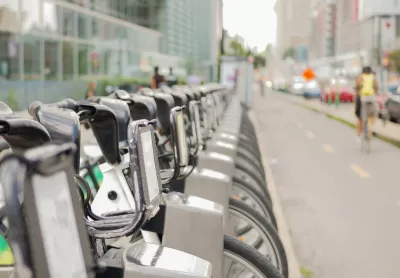A combination of infrastructure, connectivity, and quality equipment has made the Canadian city’s bike share system successful despite frigid winters and challenging geography.

With the average daily February temperature at 26 degrees Fahrenheit, how did Montreal become a city of cyclists? A piece by Ben Abramson in Strong Towns investigates.
Montreal’s bikeshare program, called BIXI, has grown exponentially since launching in 2009. With over 10,000 bikes, it has the largest fleet in Canada and one of the largest in North America. BIXI has a user base of more than 500,000 riders, who took almost 12 million trips in 2023, more than double the 5.8 million in (pre-COVID) 2019.
The system added winter service this year. Abramson writes that the city set up the bike share system for success in a number of ways. “On the product side, it was important to launch with high-quality cycles, a well-designed network, and a pricing structure that riders are comfortable with.”
The system is also well integrated with local public transit and other transportation infrastructure. “But most important of all is making the network available where users live and travel between.” The system uses fixed stations scattered throughout the region, not just in central Montreal, providing a broad network that avoids the issues faced by dockless devices.
FULL STORY: How a Cold, Hilly Canadian City Became a Year-Round Cycling Success Story

Maui's Vacation Rental Debate Turns Ugly
Verbal attacks, misinformation campaigns and fistfights plague a high-stakes debate to convert thousands of vacation rentals into long-term housing.

Planetizen Federal Action Tracker
A weekly monitor of how Trump’s orders and actions are impacting planners and planning in America.

In Urban Planning, AI Prompting Could be the New Design Thinking
Creativity has long been key to great urban design. What if we see AI as our new creative partner?

King County Supportive Housing Program Offers Hope for Unhoused Residents
The county is taking a ‘Housing First’ approach that prioritizes getting people into housing, then offering wraparound supportive services.

Researchers Use AI to Get Clearer Picture of US Housing
Analysts are using artificial intelligence to supercharge their research by allowing them to comb through data faster. Though these AI tools can be error prone, they save time and housing researchers are optimistic about the future.

Making Shared Micromobility More Inclusive
Cities and shared mobility system operators can do more to include people with disabilities in planning and operations, per a new report.
Urban Design for Planners 1: Software Tools
This six-course series explores essential urban design concepts using open source software and equips planners with the tools they need to participate fully in the urban design process.
Planning for Universal Design
Learn the tools for implementing Universal Design in planning regulations.
planning NEXT
Appalachian Highlands Housing Partners
Mpact (founded as Rail~Volution)
City of Camden Redevelopment Agency
City of Astoria
City of Portland
City of Laramie





























